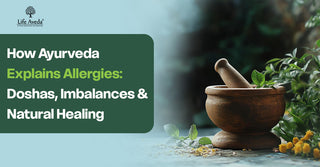Constantly bombarded with stress and toxins, our body and mind suffers the imbalance. As a result, we may feel sluggish, fatigued, and disconnected from our optimal selves. Yes, searching for a reset button continuously we try different things, diet, exercising and many more. Panchakarma therapy, an Ayurvedic practice that offers a profound solution for detoxification, rebalancing, and renewal. The treatment is designed to gently yet effectively remove deep-seated toxins, restore balance to the body's three doshas (Vata, Pitta and Kapha) and rejuvenate the mind, body and spirit.
In this blog, we will gather information and understand the details about Panchakarma Therapy.
Panchakarma Therapy: The 5-Step Program to Purify, Nourish and Transform
The tridosha which are mentioned above are Vata, Pitta and Kapha, are known to support body functioning and maintain health. But their imbalance can result in the opposite. Mild imbalances can be easily rectified with external treatments like soothing oils, nourishing pastes, and gentle internal medications like tablets, aasav, and arisht. However, when the imbalance spirals out of control, it's time to bring in the heavy artillery - Panchakarma therapy.
Panchakarma, in Sanskrit means Five Karma or procedures. Before and after Panchakarma there are some pre and post procedures which are mandatory.Below is the detail for all.
Purva Karma (Pre Panchakarma Procedures)

A set of procedures are done before the main procedure. These include:
- Internal Lubrication: Patient is administered with oils or ghee through oral route for 3-7 days depending on the symptoms of the disease.
- External Lubrication: It's done by the method of oiling and is done for a minimum 3 days.
- Sudation: Followed by external lubrication, the patient is simultaneously asked to go for sudation. Sudation is swedana, a process to induce sweat in patients.
Pradhan Karma (Main Procedure)
It includes total five procedures
- Vamana: Therapeutic Emesis
Removal of toxins by the means of vomiting is called Vamana. After Purva karma the patient is administered with vomiting inducing medication. It is specifically done for conditions with imbalance of kapha dosha.
- Virechana: Therapeutic Purgation
It refers to removal of toxins by means of purgation. Purgation is therapeutically induced expulsion of stools or fecal matter. Typically done in case of Pitta imbalance. Afterwards a diet regimen is guided.
- Niruha/ Asthapana Basti: Decoction Enemas & Anuvasana Basti: Unctuous Enemas (prepared with oils/ghee)
Basti is done to balance the vitiated Vata dosha. The administration of the medicine is done through anal route so that direct absorption at the level of intestines can take place.
- Nasya: Nasal Medication
Nasya is the installation of herbal liquids or powders through the nasal route. It is usually recommended in case of diseases related to ear, eyes, nose, neck and head.
These five are mentioned by Aacharya Charak.
On the other hand, Acharya Sushruta has mentioned the fourth dosha that is Rakta or Blood. For this he has told Rakat Mokshan or bloodletting as well.
Pashchat Karma (Post Panchakarma Procedures)
This includes the samsarjanakarma karma (dietary regimen) and Brimhana Karma (nourishment therapy).
Also, panchakarma therapy is not only guided to a diseased person but to a healthy one as well. A healthy person is allowed to undergo every procedure related to panchkarma but only under the guidance of an expert. As it helps in bringing back the balance in the case of diseased, it also helps to maintain the same in the healthy one.
Panchakarma Therapy: Things to Avoid
अत्यासनस्थानवचांसि यानं स्वप्नं दिवा मैथुनवेगरोधान्||
शीतोपचारातपशोकरोषांस्त्यजेदकालाहितभोजनं च| (Charak Samhita kalpa Sathana 1/54-55)
The verse states that there are certain things which are to be avoided while your panchakarma therapy is going on. These are:
- Excessive sitting: Avoid prolonged periods of sitting during cleansing therapies.
- Excessive standing: Minimize standing for long periods to avoid fatigue.
- Excessive speaking: Reduce talking to avoid unnecessary energy expenditure.
- Riding: Avoid traveling or riding during cleansing therapies.
- Daytime Sleep: Try to avoid sleeping during the day to maintain the body's natural rhythm.
- Sexual Intercourse: Abstain from sexual activity to conserve energy.
- Suppressing Natural Urges: Allow yourself to respond to natural urges like urination, bowel movements, etc.
- Cooling Regimens: Avoid cooling therapies like cold baths, cold compresses, etc.
- Sun Exposure: Limit exposure to direct sunlight during cleansing therapies.
- Grief and Anger: Try to manage emotions and avoid excessive grief or anger.
- Unwholesome Food: Avoid consuming untimely or unwholesome food that can hinder the cleansing process.
Life-Changing Advantages of Panchakarma Therapy

The advantages of panchakarma includes the following:
- Purification of Body: The accumulated Ama or toxins are expelled out of the body through oral or anal route along with vitiated dosha.
- Balancing Dosha: The balance of tridosha is restored.
- Brings Mental Wellbeing: As the body is happy so is the soul and mind. Better
- Digestion and Absorption: Once your gut is cleared from the toxins, it automatically starts working normally as it's free from blocked or clogged micro channels.
Conclusion
Panchakarma Therapy is life changing. It can help in different disorders and can also prevent diseases or dosha imbalance in the healthy person. But only if done correctly. Non- expertised people performing panchakarma therapies can cause a lot of harm, that’s why it's really important that you must choose your consultant or Ayurveda expert wisely. Otherwise, the condition may worsen, in case of diseased and in case of a healthy person, imbalance of doshas is observed. So, to have only the positive effects of panchakarma it's important to be alert and attentive while choosing your doctor.
Life Aveda offers personalized Ayurvedic consultations to determine the most appropriate Panchakarma procedures for your specific health needs and conditions. Our experienced Ayurvedic practitioners will guide you about the therapy, ensuring a safe and effective detoxification process.
For more information or to schedule a consultation, feel free to contact us at 7743002520. We will be happy to assist you with any questions or concerns regarding Panchakarma Therapy and other Ayurvedic treatments.



